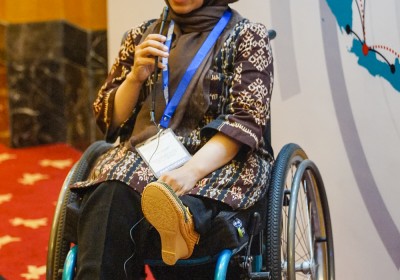Creating Inclusive Opportunity for Persons with Disabilities
May 14, 2019
Researcher and Person with a Disability who was a speaker at Indonesia Development Forum 2018
Based on Population Survey Among Census 2015, the number of persons with disabilities is 8.56 per cent of the total population, and the majority are among the poor, most of them unemployed. Persons with disabilities are a group who are vulnerable to poverty. Their poverty is linked with limited access to jobs and skill development.
“Law Number 8 the Year 2016 provides the opportunity for persons with disabilities to obtain work, at minimum 1 per cent of workers at private sector and 2 per cent at government institutions,” said the Secretary of Center for Disability Study and Services, Slamet Tohari, mid-January 2019.
Amex, Slamet’s nickname, said that next, the government should ensure the implementation of said regulation. Inclusiveness at the workplace can only be achieved when its infrastructure and system are accessible to persons with disabilities.
Read: https://indonesiadevelopmentforum.com/2018/blog/4443-pasar-kerja-inklusif-mungkinkah
Opportunities for more inclusive education and work are some ways to empower persons with disabilities. Amex said there needs to be a platform that bridges persons with disabilities and companies looking for workers.
Currently, there are two applications connecting persons with disabilities with employers, namely Dnetwork and Kerjabilitas. Amex hopes that the government also makes a similar application, reaching wider companies and workers all the way to the corners of the country.
The digital application does make it easier for persons with disabilities to find work. Not only that, but they can also use the internet to sell and market their products. So, they can do online business without having to leave their houses.
“Thanks to digital technology, persons with disabilities can interact with other people. They can also learn remotely. Previously, their learning process was hindered because not many libraries were accessible to them,” said Amex.
Business opportunities continue to open after the Finance Services Authority (OJK) and the National Development Planning Agency promote financial institutions accessible to persons with disabilities. Previously, financial institutions assumed that persons with disabilities are not potential markets.
The study result conducted by the government, along with Kolaborasi Masyarakat dan Pelayanan untuk Kesejahteraan (KOMPAK), indicated that most financial institutions have no special policy in providing financial services to persons with disabilities. The majority of financial institutions also have no technical guideline for providing financial services to disabled customers/potential customers.
“We set out several primary recommendations from such study result, on how to encourage bank and non-bank financial institutions to reach persons with disabilities. OJK supports the development of Operational Technical Guideline (PTO) for financial services to persons with disabilities, “ said KOMPAK Gender Equality and Social Inclusion Manager, Ratna Fitriani, during the KSI Xchange discussion entitled “Making Research Inclusive: Listening to the Voices of People with Disability”, Thursday, January 17, 2019.
Driven through Education
The Sociology Professor of Brawijaya University, who is also the Secretary of the Centre for Disability Study and Services, Slamet Tohari, said that the government’s concern towards persons with disabilities is increasing. The number of inclusive schools continues to increase every year. He added, students taking teacher’s education as their college major receive inclusive education course.
Data from the Ministry of Education and Culture shows that regions implementing inclusive education culture have reached 23 provinces and 102 districts/cities, with 31,724 inclusive schools, and 128,192 children enrolled in inclusive schools.
Improvement to increase inclusiveness on primary education, according to Amex, can be done by building the capacity of classroom supporting teachers mentoring students with disabilities. Up to date, there has yet to be schools or courses that educate support teachers specifically. They are often regular people instantly shaped to support teachers.
“The government’s measures toward primary education must be followed up by providing opportunities at higher education level,” said Amex.
There are three recommendations so that an increasing number of people with disabilities can enrol at higher education, even becoming lecturers such as himself. First, the government should encourage universities to accept persons with disabilities, with the end result being their affirmation by giving a special enrolment path for them.
Second, increasing the accessibility of teaching and learning infrastructures and facilities for students and lecturers with disabilities. Third, allocating special scholarships for persons with disabilities.
A researcher from La Trobe University, Australia, and the founder of Australia-Indonesia Disability Research and Advocacy Network (AIDRAN), Dina Afrianty, said that universities and state, as well as non-government research institutions, need to produce researches on disability. The result of these researches can drive more inclusive public policies.
“However, researches need to involve persons with disabilities as researchers to avoid bias and produce a report that is relevant to the actual condition,” said Dina.
Amex added that inclusive researches need to avoid excessive charity bias or consider disability as an extraordinary factor in need of excessive advocacy. The disparity happening today with persons with disabilities is because they are being hindered.
"If they (persons with disabilities) have access, it will not be considered disability anymore,” continued Amex.
Public policies based on this research is needed by the Government of Indonesia so that the impact of development is felt by all of the people in Indonesia, including vulnerable groups. Indonesia Development Forum serves as one of Bappenas’ efforts to gain input from the people regarding inclusive development.
The forum, supported by the Government of Australia through Knowledge Sector Initiative, promotes ideas to reduce disparity based on knowledge and good practices. Send your ideas and solutions to create economic opportunities and achieve sustainable inclusive development to Indonesia Development Forum 2019
Indonesia’s Research Institutions Supporting the Development of the Electric Vehicle Industry
Indonesian Muslim Fashion and Cosmetics IKMs Shine at Dubai World Expo 2020
Govt Steps Up UMKM Transformation Efforts in the Midst of Pandemic Slowdown
Govt Encourages Promotion of IKM Products in Digital Era
Government Begins Developing Maritime Training Center in Makassar
Tweets by IDDevForum
